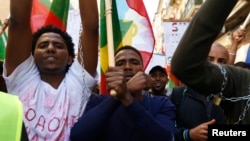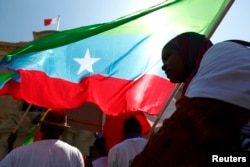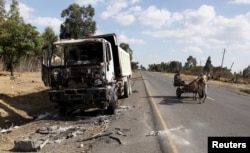Protests throughout the Oromia region of Ethiopia are now four months old, and despite the cancellation of a plan to expand the limits of the capital city, Addis Ababa, and government claims that all has returned to normal, violent crackdowns continue, according to a new report by the Human Rights Watch.
The report details statements from opposition members and activists saying that more than 200 people have been killed since November 12 and thousands more have been arrested. It outlines crimes by state security forces, including firing aimlessly into crowds of protestors and torturing detainees.
One of the most disturbing incidents outlined in the report involves clashes between security forces and student protestors at Jimma University in western Oromia on January 10 and 11. The report says security forces threw a grenade at students injuring dozens, according to the report, and then stormed dormitories, arresting not only students, but teachers, government officials, health care workers and citizens who gave shelter to students.
“They walked into the compound and shot three students at point blank range,” a 17-year-old student told HRW.
In detention, some students reported being hung by their wrists and beaten, while one 18-year-old said security forces administered electric shocks to his feet. Several women in detention reported being sexually assaulted and raped, HRW said.
‘Excessive use of force’
Leslie Lefkow, the deputy director for Human Rights Watch's Africa Division, said that among the most disturbing findings was the fact that many of those detained or killed were 18 or younger.
“Let’s be clear. The government response to these protests since November has been disproportionate, have used excessive force, and has resulted in a massive amount of human rights violations against these protesters, so that’s the majority of whom have been peaceful and many of them have been students and many of them are children under the age of 18,” she said.
The report says government officials also have been using charged rhetoric during the government crackdown, accusing protesters of being linked to terror groups. The Human Rights Watch report points to a message by Ethiopia’s prime minister on December 16 stating that the government would “take merciless legitimate action against any force bent on destabilizing the area.”
“This was really alarming and disturbing language and may even have contributed to the excessive use of force by the security forces who were deployed around the time these statements were being made,” Lefkow said.
Prior to the release of the report, Ethiopia's communications minister, Getachew Reda, said the recent clashes that have occurred in Shashemene and southern Oromia region in February are not related to earlier protests and involved heavily armed groups, not peaceful protesters.
“There have been armed attacks on government installations, security personnel and actually the burning down of social institutions, including churches and mosques, and so it has hardly anything to do with, for example, what were witnessed in southwest Shewa or west Shewa, last month before last month,” he said.
Expansion Plan Cancelled
Ethiopia boasts one of the fastest growing economies in the world with more than 10 percent growth annually. To harness this growth, the Ethiopian government has laid out several developmental projects.
One of the most controversial in recent years has been an expansion plan for the capital city called the Integrated Regional Development Plan, or more commonly known as Addis Ababa’s Master Plan. The Master Plan aims to expand the municipal boundary of the city to accommodate an increase in development demands. However, it has caused a backlash and resulted in student protests spreading throughout the Oromia region.
The Oromo People’s Democratic Organization, Ethiopia's ruling party affiliate, announced on January 12 that the plan has been cancelled. HRW says that despite the cancellation, there has been “confusion over the actual status of the plan and whether the government will follow through with the cancellation.”
The plan aimed to expand the capital city into the municipal boundaries so that the administration of the city encroaches the boundaries of the Oromia region, a region that encompasses large masses of land where Oromo farmers have historically resided. If the city’s municipal boundaries expand, it will overtake areas previously administered by the Oromia administration.
The Oromia region is one of Ethiopia’s nine ethnically based states, surrounding Addis Ababa and including much of central and southern Ethiopia.






